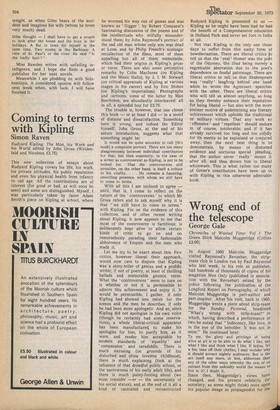Coming to terms with Kipling
Simon Raven
Rudyard Kipling: The Man, his Work and his World edited by John Gross (Weidenfeld and Nicolson £3.75)
This new collection of essays about Rudyard Kipling covers his life, his work, his private attitudes, his public reputation and even his physical health from infancy to old age. All the contributions are of interest (for good or bad, as will soon be seen) and some are distinguished. Myself, I was particularly taken by Janet Adam Smith's piece on Kipling at school, where he wormed his way out of games and was known as ' Gigger '; by Robert Conquest's fascinating discussion of the poems and of the intellectuals who wilfully misunderstand them; by John Raymond's portrait of the sad old man whose only son was dead at Loos; and by Philip French's nostalgic recollection of the films, most of them appalling but all of them memorable, which had their origins in Kipling's prose or verse. There are also some perceptive remarks by Colin Maclnnes (on Kipling and the Music Halls), by J. I. M. Stewart (on critical appraisals of Kipling at various stages in his career) and by Eric Stokes (on Kipling's imperialism). Photographs and cartoons, some of the latter by Max Beerbohm, are abundantly interleaved: all in all, a splendid buy for £3.75.
The trouble is, however, that one closes this book — or at least I did — in a mood of distaste and dissatisfaction. Something here is wrong, and indeed the Editor himself, John Gross, at the end of his astute introduction, suggests what that something might be:
It would not be quite accurate to call [th's book] a composite portrait. There are too many disagreements between individual contributors ler that; but then unanimity, in the case of a writer as controversial as Kipling, is not to be looked for. That the controversies still smoulder, on the other hand, is itself a tribute to his vitality. . . . He remains a haunting, unsettling presence, with whom we still have to come to terms.
With all this I am inclined to agree — until, that is, I come to reflect on the
nature of the ' controversies' to which Mr Gross refers and to ask myself why it is that "we still have to come to terms" with Kipling. For on the evidence of this collection, and of other recent writing about Kipling, it now appears to me that most of the controversy is factitious, is deliberately kept alive to allow certain kinds of critic to go on and on remorselessly parading their fashionable abhorrence of Empire and the men who made it.
Let me try to be exact about this. Few critics, however liberal their approach, would now care to dispute that Kipling was a story-teller of genius and a prolific writer, if not of poetry, at least of thrilling ballads and memorable gnomic verse.
What the 'controversies ' seem to turn on is whether or not it is permissible to admire this achievement and enjoy it. It would be permissible, I gather, if only Kipling had showed less relish for the scenes and the men he describes, if only he had been more apologetic. And so, since Kipling did not apologise in his own voice (though he certainly had some reserva tions), a whole liberal-critical apparatus has been manufactured to make his apologies for him, to purify him, as it were, and render him acceptable by modern standards of ' equality ' and 'compassion ' and taradiddle. There is much excusing (on grounds of his disturbed and often loveless childhood), there is much explaining (look at the influence of that dreadful public school, or the narrowness of his early adult life), and there is much pussy-footing about (we must consider —er — the uncertainty of his social status); and at the end of it all a kind of castrated and reconstructed
Rudyard Kipling is presented to us — Kipling as he might have been had he had the benefit of a Comprehensive education in Holland Park and never set foot in India at all.
Not that Kipling is the only one these days to suffer from this nasty form of bowdlerisation. There are liberal critics to tell us that the ' real ' Homer was the poet of the Odyssey, the Iliad being merely a regrettable aberration due to the poet's dependence on feudal patronage. There are liberal critics to tell us that Shakespeare was ' really ' laughing behind one hand while he wrote the Agincourt speeches • with the other. There are liberal critics who will tell us almost anything, as long as they thereby enhance their reputation for being liberal — but also with the more sinister motive of undermining any literary achievement which upholds the traditional or military virtues. That any work so ' offensive ' and ' repellent' should endure is, of course, intolerable; and if it has already survived too long and too solidly for its merits to be explained or conjured away, then the next best thing is to demonstrate, by means of distorted evidence and unctuous special pleading, that the author never ' really' meant it after all, and thus drown him in liberal whitewash. This is what rather too many of Gross's contributors have been up to with Kipling in this otherwise admirable book.










































 Previous page
Previous page